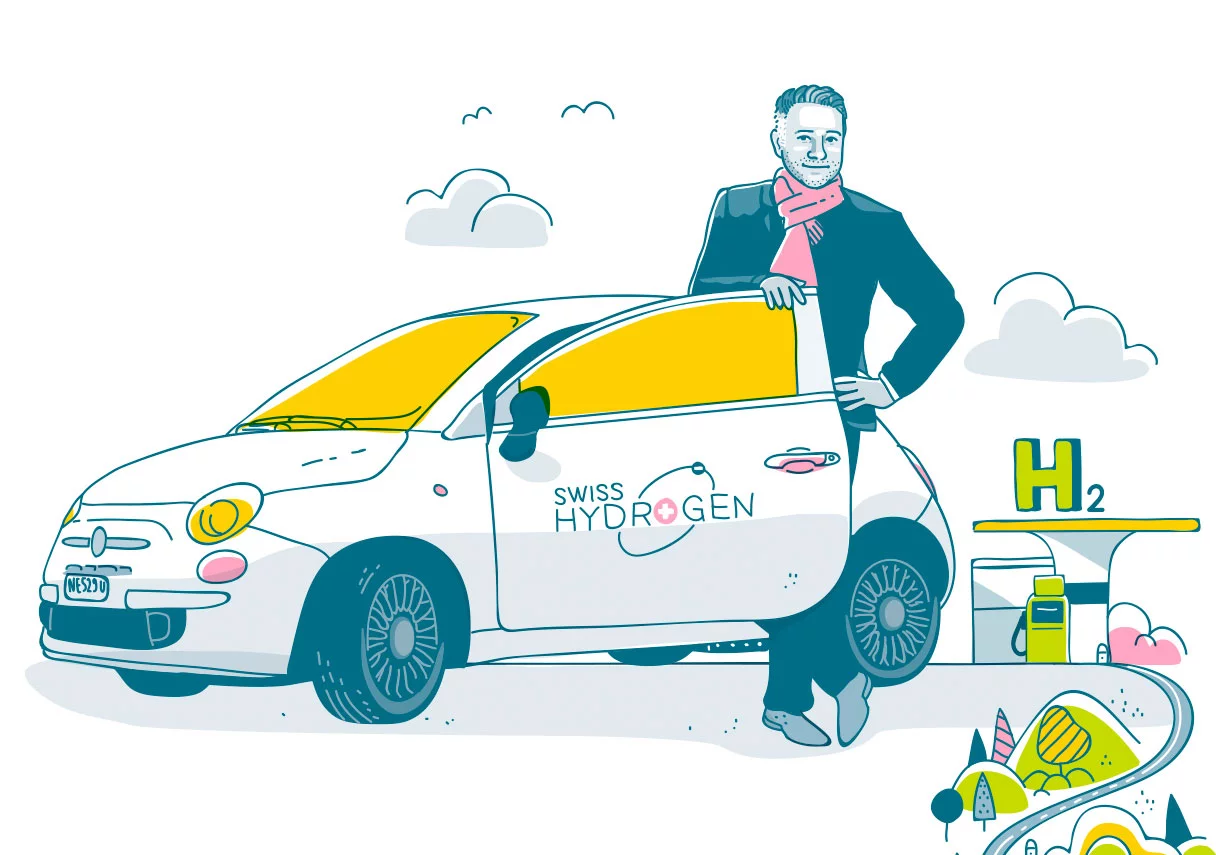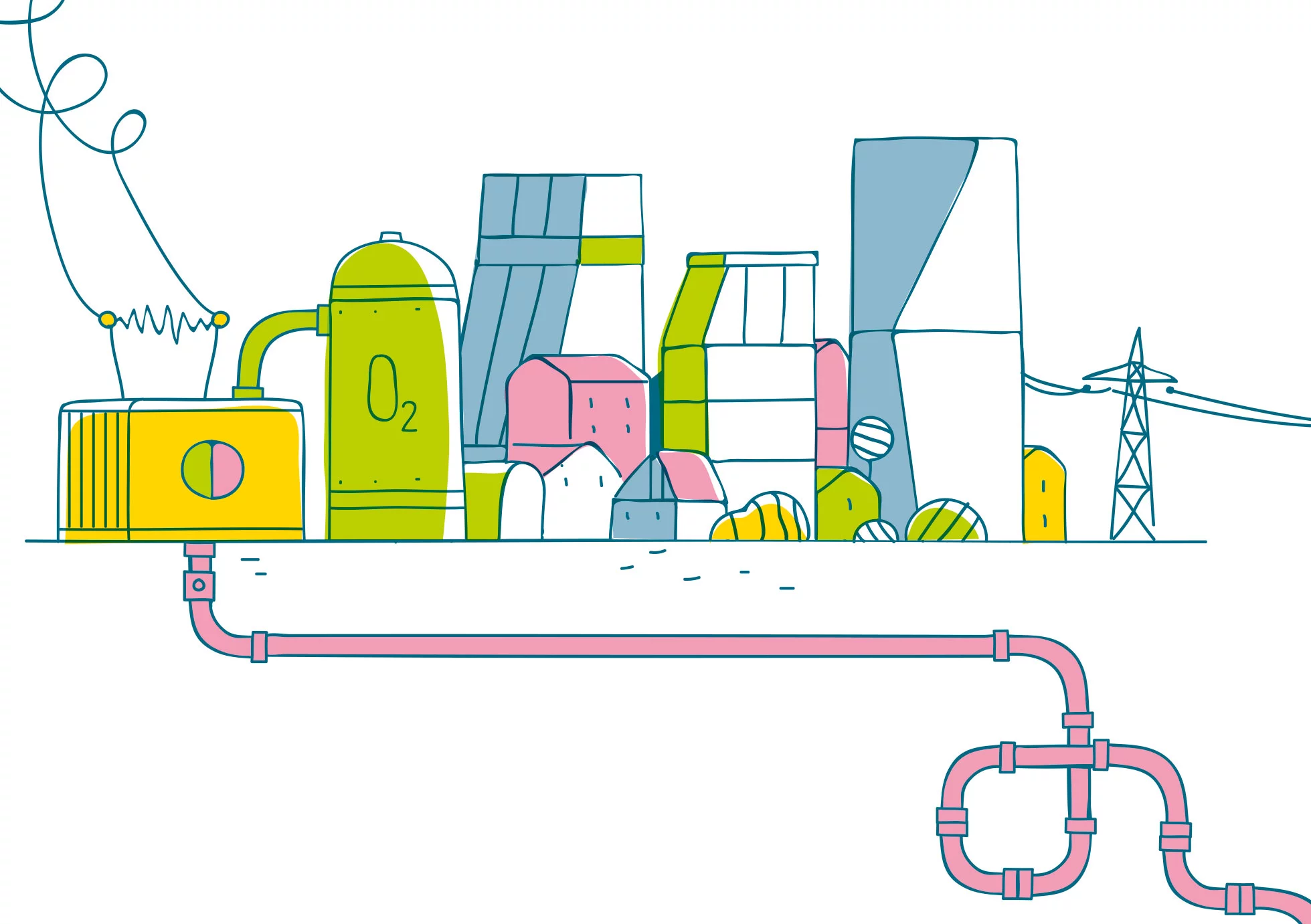The young company Swiss Hydrogen is located in Fribourg. Here work is under way on competitive high-performance fuel cells that could be used in environmentally friendly vehicles or deployed as stationary power generators. In the company's collaboration with the Paul Scherrer Institute PSI, as CEO Alexandre Closset explains in this interview, both sides profit.
5232: Mr. Closset, what links your company to PSI?
Alexandre Closset: Since the founding of Swiss Hydrogen in 2015, PSI has been our closest research partner, and we're very happy about that. In the beginning all we had was office space, no laboratories – during this time, we used labs at PSI. Our firm only survived, in fact, because we were able to carry out the assembly and testing at PSI.
And since that time?
By now we have our own assembly and storage spaces, but the collaboration with PSI is still intensive: The knowledge that is created thanks to the PSI research flows to us. We use it to further advance fuel cells. We test our new developments, in turn, at PSI's ESI Platform – and in doing so, we rely on the PSI infrastructure and on the expertise of the PSI researchers as well, to interpret the test results well and correctly. In return, among other things, we have made a commitment to provide four novel 60-kilowatt fuel cells. And then the collaboration has also been, from the start, a very close and personal one. One indication of this, among others, is that former early-career researchers at PSI now work here; one of them is our head of development.
Could you briefly explain why Switzerland needs fuel cells?
Fuel cells are energy converters. We work on two variants: One type uses hydrogen that is stored in a tank and takes in air from the surroundings; from these two ingredients, the fuel cells generate electric current. The other type uses pure oxygen instead of air – likewise, from a tank. This second variant is more efficient. But it requires two tanks, which for many applications, such as electric cars, is not so advantageous.
So the fuel cells you mentioned first, the hydrogen-air fuel cells, are mainly of interest for vehicles?
Exactly: Here at Swiss Hydrogen we already have several electric vehicles whose kilometre-range is increased significantly by fuel cells. Since 2013, I myself have been driving a Fiat 500 with fuel cells that I co-developed, which now has more than 140,000 kilometres on the odometer. Even though it's a prototype, in all these years I really have had very few technical problems with it. One of our latest successes is a zero-emission truck. Coop wanted to have such a heavy goods vehicle and found a good partner in Swiss Hydrogen: In comparison with competitive products, our fuel cell achieved the highest power density. So since 2017, a 34-ton truck has been driving in the Coop fleet with a fuel cell developed by us.
And where do you see the application area for the hydrogen-oxygen cells?
These are well suited for stationary use. The excess energy from wind power plants and photovoltaic installations can be used to produce pure hydrogen and pure oxygen; from those, large fuel cells would generate electricity again on demand. We are currently working on this kind of fuel cell with the researchers at PSI's ESI Platform. In this way we are contributing jointly to the realisation of the federal government's Energy Strategy 2050.
How does the approach people in your company take differ from that of the PSI researchers?
I'd say we're simply looking at the same thing from different directions. For example, the researchers are very good at solving a scientific problem. And we sometimes need to remind them that the technical solution also has to make sense economically. We at Swiss Hydrogen pay attention to three things: the industrial feasibility, the costs, and the intellectual property of an idea. And so we have actually said to the PSI researchers once or twice already: We're sorry, no, we're not interested in this solution, because even if it works, it will never turn out to be competitive in the market. In practice that means, for example: For a particular component, a cost of a thousand Swiss francs or so may be acceptable for the prototype – but only if this component can be mass-produced later on for ten francs.
Will the collaboration with PSI continue?
Yes, definitely! In the buildings of Park Innovaare that will be built right next to PSI in the coming years, we plan to move into offices with one or two employees to form an even closer working relationship. The fuel cell research at PSI is recognised not only throughout Switzerland, but also internationally, all over the world. PSI is and remains our closest academic partner.
Interview: Paul Scherrer Institute/Laura Hennemann
About Alexandre Closset
Alexandre Closset is the CEO of Swiss Hydrogen, which since January 2018 is a subsidiary of Plastic Omnium. He studied physical engineering science at EPFL, holds an MBA, and was active for a long time in the area of flexible solar modules before switching to fuel cells. In 2015, he was co-founder of the start-up venture Swiss Hydrogen, which spun off from the Swatch Group and focused on the commercialisation of hydrogen fuel cells.
Additional information
Using what's there: A background article which shows how researchers at PSI are looking for solutions that enable energy from the sun, the wind, or biomass to be efficiently integrated into the Swiss energy system.
New technology under real-world testing: An interview with Peter Dietiker, division manager at the Zurich-based power company Energie 360°, about the collaboration with PSI.



